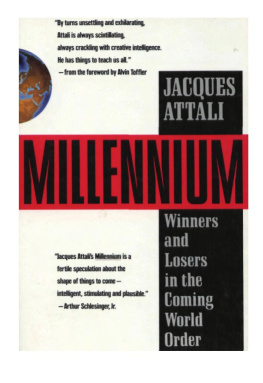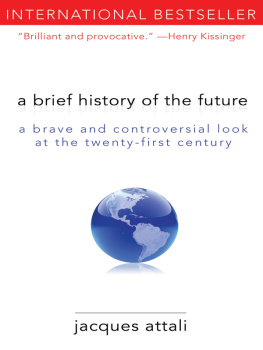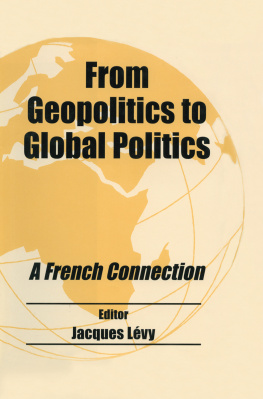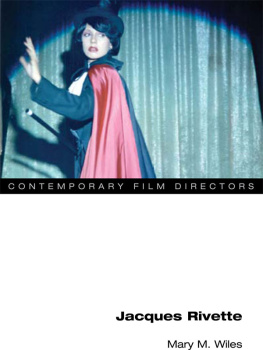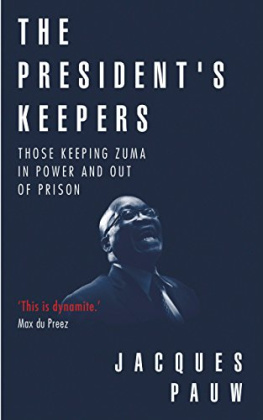Attali Jacques - Millennium. Winners and losers in the coming world order
Here you can read online Attali Jacques - Millennium. Winners and losers in the coming world order full text of the book (entire story) in english for free. Download pdf and epub, get meaning, cover and reviews about this ebook. year: 2009, genre: Politics. Description of the work, (preface) as well as reviews are available. Best literature library LitArk.com created for fans of good reading and offers a wide selection of genres:
Romance novel
Science fiction
Adventure
Detective
Science
History
Home and family
Prose
Art
Politics
Computer
Non-fiction
Religion
Business
Children
Humor
Choose a favorite category and find really read worthwhile books. Enjoy immersion in the world of imagination, feel the emotions of the characters or learn something new for yourself, make an fascinating discovery.
- Book:Millennium. Winners and losers in the coming world order
- Author:
- Genre:
- Year:2009
- Rating:5 / 5
- Favourites:Add to favourites
- Your mark:
- 100
- 1
- 2
- 3
- 4
- 5
Millennium. Winners and losers in the coming world order: summary, description and annotation
We offer to read an annotation, description, summary or preface (depends on what the author of the book "Millennium. Winners and losers in the coming world order" wrote himself). If you haven't found the necessary information about the book — write in the comments, we will try to find it.
Attali Jacques: author's other books
Who wrote Millennium. Winners and losers in the coming world order? Find out the surname, the name of the author of the book and a list of all author's works by series.
Millennium. Winners and losers in the coming world order — read online for free the complete book (whole text) full work
Below is the text of the book, divided by pages. System saving the place of the last page read, allows you to conveniently read the book "Millennium. Winners and losers in the coming world order" online for free, without having to search again every time where you left off. Put a bookmark, and you can go to the page where you finished reading at any time.
Font size:
Interval:
Bookmark:

"Sometimes big topics are best handled in small books... Jacques Attali, the controversial Frenchman who runs the newly created European Bank for Reconstruction and Development, has done just that."
T I M C A R R I N G T O N , The Wall Street Journal
"Attali is a one-man think tank, a prolific generator of thoughts and theories."
C H R I S T O P H E R R E D M A N , Time
"Jacques Attali is a unique figure: an intellectual in the world of politics, an individualist in the world of high finance, a visionary and a dreamer. This startlingly fresh and sometimes maddeningly provocative booka description of the future by one of the men who will make itis required reading for anyone seriously interested in politics, culture, and finance."
W A L T E R R U S S E L L M E A D, author of
Mortal Splendor: The American Empire in Transition
"A brilliant man, Attali produces more ideas in a week than most people do in a year."
The Economist
"Millennium bears all the marks of Jacques Attali: the intellectual nerve, the extraordinary ambition, the breadth of coverage, the iconoclastic statements. It's the kind of book that sets one, as the French put it, to thinking furiously."
D A V I D S. L A N D E S , author of The Unbound Prometheus
"Provocative and brilliantly written."
W I L L I A M P. B U N D Y , The Asian Wall Street Journal
Contents
Foreword by Alvin Toffier vii
I THE C O M I N G WORLD O R D E R 3
II THE S T R U G G L E FOR S U P R E M A C Y 35
III M I L L E N N I A L L O S E R S 71
IV N O M A D I C MAN 87
v THE A B A N D O N M E N T OF S O V E R E I G N T Y 117
AND THE NEED FOR L I M I T S
Foreword
The fact that my friend Jacques Attali is unknown to most Americans, including most American thinkers and policymakers, is a measure of America's intellectual provincialism. Jacques Attali was for nearly ten years the man who sat directly outside the office of French President Francois Mitterrand; the man who accompanied him at his meetings with Soviet President Mikhail Gorbachev and other world leaders, whispering ideas and helping to introduce Mitterrand to the twenty-first century.
Attali is now president of the European Bank for Reconstruction and Development. This is the institution created to help Eastern Europe make the painful transition from its centrally planned economies to workable market-based ones. This much at least has been reported in the American press.
What remains largely unknown, even by sophisticated vii
FOREWORD
Americans, is that Jacques Attali, in what might be called his alternative life, is one of Europe's premier intellectsa man who possesses enormous energy, sparkle, drive, imagination, and ideas.
Ideas, and still more ideas, plus a ravenous curiosity revealed in the subjects of the fifteen books he has written, many at four o'clock in the morning before he headed off for his desk at the Elysee Palace.
I first became aware of Attali when I heard of his book Anti-Economics. Wonderful, I thought. It's about time someone took on conventional economics and delivered a swift kick to its hardened categories. He was a product of France's most prestigious grandes ecoles, precision-tooled to become a high-level bureaucrat, prepared for a lifetime devoted to scrupulous observance of the rules, yet he was willing to question some of the most fundamental assumptions of mainstream economics. Score One.
I was unaware at the time that he had also written two books on political models and the interaction of politics and economics.
These were followed by a study of technology. So far, his career appeared to be more or less "respectable." But what was one to make of a trained bureaucrat who took time off to write Bruits (a title that could be translated as Noise), a work actually devoted to the politics and economics of music? And not to the economics of today's music industry. Instead, it is a deeply philosophical rumination on the relationship of music to political culture from ancient times to the present,
viii
F O R E W O R D
with all sorts of strange, original insights lighting up the book's horizon.
Or what about his parallel study of the political role of medicine in society? Or his work of economic history, Les Trois Mondes? Or, even more surprising and interesting, his book on the history of concepts of time? Hardly what one might expect of a conventional economist or government official.
By now Mitterrand had been elected president of France, and Jacques was ensconced outside his office. So close, in fact, that to reach his own desk Mitterrand had to pass by Jacques'. The first time I visited him at the Elysee he apologized to me with a twinkle in his bespectacled eye, saying that we might have to vacate his office for a few minutes when President Mitterrand, accompanied by the then-president of Italy, needed to pass through. Together we ducked for a few seconds into what seemed like a narrow, secret corridor, as the two heads of state strolled by in private conversation. We then returned to Jacques' desk to continue our chat.
Since then, Jacques has written A Man of Influence, a.
sympathetic biography of the international banker Siegmund Warburg; a book on the nature of property; two novels about eternity; and further historical studies. Put these together and a picture emerges of a sparkling intellect impatient with the conventional wisdom of our timea controversial figure in European intellectual life, now presiding over a $12 billion i x
F O R E W O R D
bank that could turn out to be a pillar of the new global order. Jacques is that rare figure in today's world, an intellectual idea-man who can put his ideas into action. As such, he is dealing with Europe's most critical issuethe changed relationship between Western and Eastern Europe.
It is within this context that I recommend Millennium, a short, pithy, significant book about, among other things, America's future in a world Attali pictures as increasingly dominated by Europe and Japan. It is a book that is by turns unsettling and exhilarating. Whether he is talking about the normalcy of crisis, or discussing the "nomadic objects" that in his opinion will be the main products of tomorrow's economy, or outlining the eight successive shifts of world economic power and the coming of what he calls the "ninth market form," or arguing that the key machines of tomorrow will be those that empower the consumer to become a producer of her or his own services, Attali is always scintillating, always crackling with creative intelligence.
There are many ideas in these pages with which I might well disagree. But there are few from which I cannot learn. Attali has things to teach us all. Especially Americans.
LOS A N G E L E S
March 8, 1991
X

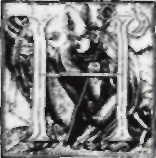
I
The Coining World Order
ISTORY is accelerating. What was beyond the grasp of imagination yesterday, except perhaps in the fertile minds of futurists and fiction writers, has already
happened today. The Berlin Wall has
crumbled; test-tube fertilization is routine, and a camel herder in sub-Saharan Africa can speak on a palm-sized cellular phone to a suburban commuter in Los Angeles. Future shock is yesterday.
Change is the only constant in a world in upheaval. The old geopolitical order is passing from the scene and a new order is being born. That order is likely to bear little resemblance to the familiar world of the last half of the twentieth century. In the next millennium, humanity's fate will be shaped by a new set of winners and losers.
Next pageFont size:
Interval:
Bookmark:
Similar books «Millennium. Winners and losers in the coming world order»
Look at similar books to Millennium. Winners and losers in the coming world order. We have selected literature similar in name and meaning in the hope of providing readers with more options to find new, interesting, not yet read works.
Discussion, reviews of the book Millennium. Winners and losers in the coming world order and just readers' own opinions. Leave your comments, write what you think about the work, its meaning or the main characters. Specify what exactly you liked and what you didn't like, and why you think so.

